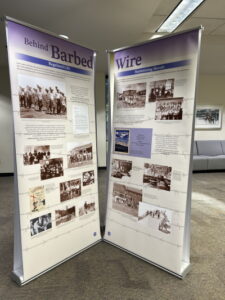
The Enemy Alien Files exhibit will be on display at Albertsons Library through September 29. This traveling exhibit from the National Japanese American Historical Society presents the experience of Italians, Germans, and Japanese immigrants in the US and from Latin America during WWII.
The library is grateful to Boise State alum, Lilith Benjamin, for bringing the exhibit to campus. Benjamin, who graduated in 2015 with a degree in English and a minor in history, went on to earn a masters degree in museum studies from the University of Toronto. She is passionate about history – she fell in love with artifacts while volunteering at a museum. “There is something close to magic about handling a physical thing, a visceral connection to the past that one can feel,” Benjamin explains. She currently works as the collections manager at the National Japanese American Historical Society in San Francisco.
When asked about her favorite memories of being a student at Boise State, Benjamin praises her professors: “It was the kindness with which two very dear professors of mine, who were on my honors graduation committee, treated me when I came out during my second-to-last week of my senior year. Their humanity and allyship made hope possible when I was really struggling with it.”
Benjamin’s organization recently presented at a local conference, which motivated her to bring the exhibit to Boise State knowing that both faculty and students would find it interesting. Enemy Aliens explores the treatment of over 31,000 “enemy aliens” including their exclusion, forced removal, internment, use in prisoner exchanges, and deportation. The exhibit experience reminds us of the fragile nature of our constitutional and human rights in times of international and domestic crisis as well as the human impact of government policies in the name of “national security.”
The exhibit is open during library hours, and made possible by the National Japanese-American Historical Society, the German-American Internee Coalition, the National Park Service, the Italian-American Studies Association, and the Japanese-Peruvian Oral History Project.